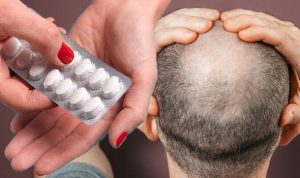Introduction: Welcome to a critical exploration of the link between medications and hair loss. I’m Dr. Harold Lancer, a dermatologist committed to helping you understand and address the prescription pitfalls that can affect your hair’s health. In this comprehensive guide, we’ll uncover the medications known to trigger hair loss and provide you with solutions to
Introduction:
Welcome to a critical exploration of the link between medications and hair loss. I’m Dr. Harold Lancer, a dermatologist committed to helping you understand and address the prescription pitfalls that can affect your hair’s health. In this comprehensive guide, we’ll uncover the medications known to trigger hair loss and provide you with solutions to maintain your hair’s vitality. Medication may be essential for your health, but it shouldn’t compromise your hair. Join me on this journey to safeguard your hair while managing your health effectively.
The Medication-Hair Loss Connection
Medications can significantly impact your hair’s health. Understanding this connection is the first step in addressing medication-induced hair loss. Many people are unaware that their prescriptions might be contributing to hair thinning or loss.
Common Medications Associated with Hair Loss
Several medications are known to trigger hair loss. Some of the most common culprits include:
- Anticoagulants: Blood-thinning medications like heparin and warfarin can cause hair loss.
- Antidepressants: Certain antidepressants, particularly those in the SSRI class, may lead to hair thinning.
- Antibiotics: Antibiotics like doxycycline and tetracycline have been associated with hair loss in some cases.
- Cholesterol-Lowering Drugs: Statins used to lower cholesterol levels can impact hair health.
- Immunosuppressants: Medications that suppress the immune system, such as those used in autoimmune disease treatments, can affect hair growth.

Image by: https://nxejt.deeprockdiver.top/blue-robot/?pl=oL_Ym0d-vEulK2KzQEIyKg&sm=blue-robot&click_id=94c5092d-0566-4685-85f4-244f74f5afe6&sub_id=w2802-windows-google-chrome&hash=cJa6bPAaNQuLdQJ6EQ9SAw&exp=1694727228#
The Impact of Medications on Hair Growth
Understanding how medications affect hair growth is crucial. Some medications disrupt the natural hair growth cycle, causing hair to enter the resting phase prematurely. This can result in hair thinning and shedding. Others may cause inflammation or nutrient deficiencies that impact hair health.
Solutions for Medication-Induced Hair Loss
If you suspect your medication is causing hair loss, consider these solutions:
- Consult Your Healthcare Provider: Discuss your concerns with your healthcare provider. They may be able to adjust your medication or recommend alternatives with fewer hair-related side effects.
- Supplements: Consider supplements that support hair health, such as biotin, zinc, and iron, under the guidance of a healthcare professional.
- Topical Treatments: Over-the-counter or prescription topical treatments like minoxidil can promote hair regrowth.
- Lifestyle Changes: A balanced diet, stress management, and a healthy lifestyle can support overall hair health.
- Wigs and Hairpieces: For severe hair loss, wigs and hairpieces can provide a temporary solution while you address the underlying issue.
Real-Life Transformations: Overcoming Medication-Related Hair Loss
Let’s explore how individuals have overcome medication-induced hair loss:
Case 1: Emily’s Journey to Healthier Hair
Emily experienced hair thinning while taking medication for a chronic condition. After consulting her healthcare provider and adjusting her treatment, her hair gradually regained its thickness.
Case 2: Mark’s Struggle with Medication-Induced Hair Loss
Mark faced medication-induced hair loss, which took a toll on his self-esteem. With the guidance of a dermatologist, he started using topical treatments and saw significant improvement in his hair density.
Expert Insights from Dr. Harold Lancer
As your guide in navigating medication-related hair loss, I’d like to offer some expert insights:
- Open Communication: Always communicate with your healthcare provider about any side effects, including hair loss, you may experience from your medications.
- Holistic Approach: Addressing hair loss often requires a holistic approach that includes lifestyle changes, supplements, and specialized treatments.
- Patience is Key: Hair regrowth takes time, so be patient and consistent with your chosen solutions.
Your Hair’s Well-Being Matters
In conclusion, your hair’s well-being is an essential part of your overall health and confidence. While medication-induced hair loss can be challenging, it’s not a battle you have to face alone. With the right solutions, support from healthcare professionals, and a commitment to your hair’s health, you can maintain your hair’s vitality while managing your health effectively. Remember, your hair deserves the care and attention necessary to thrive, even in the face of medication-related challenges.

















Leave a Comment
Your email address will not be published. Required fields are marked with *